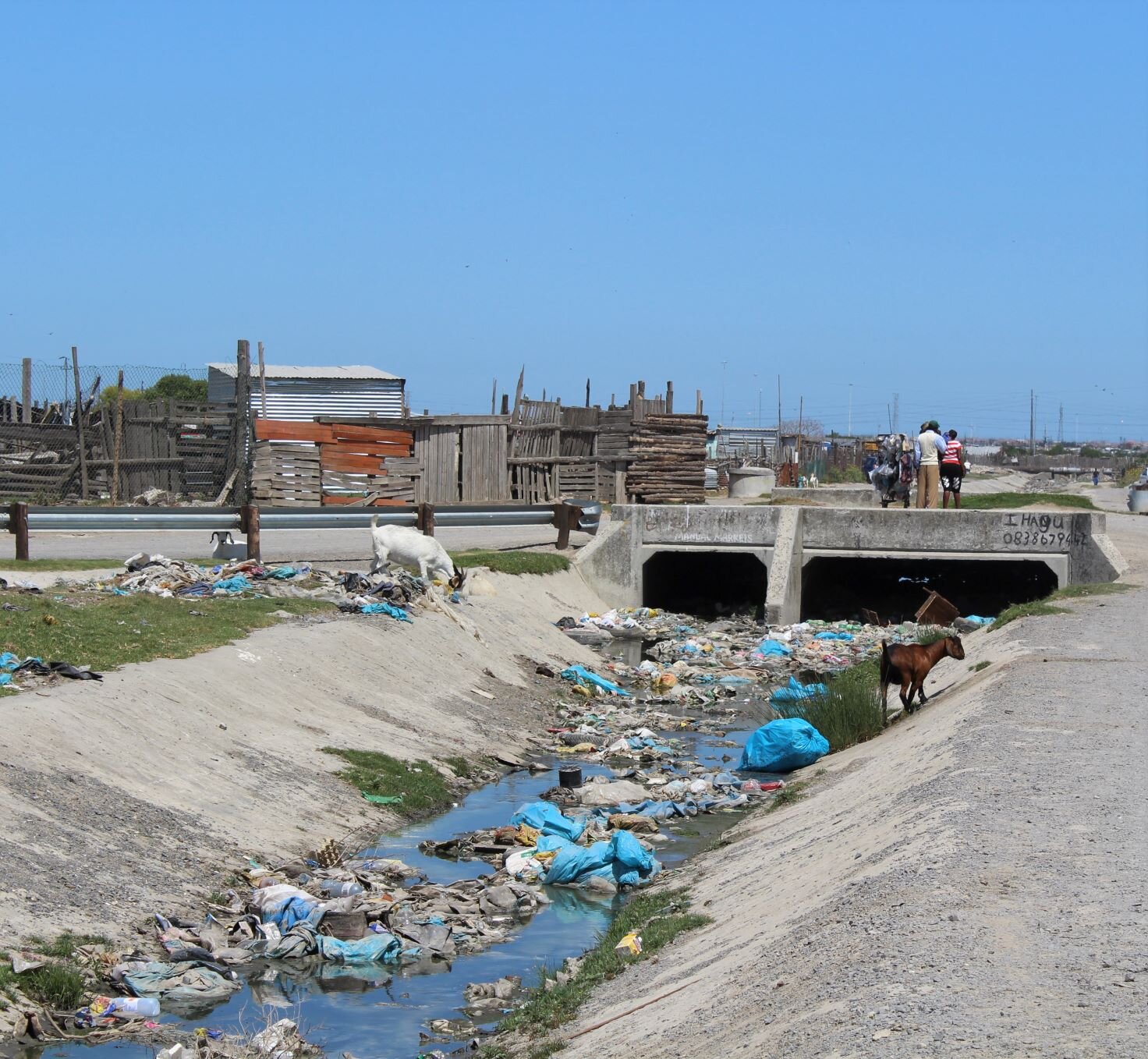March 27, 2022
by EMG - “Disease tracks inequality making South Africa particularly vulnerable to this virus. Never before has right to water and waste management services been more urgent than during the next 3 weeks of countrywide lockdown to prevent the spread of coronavirus (COVID19).” says Mandy Moussouris, director of EMG.
“Water is key: having access to clean water and soap for handwashing and surface cleaning are vital ways of preventing the spread of infection between people and staying healthy.”
“In South Africa, the most unequal country in the world, accessing basic rights to safe water and sanitation is a daily struggle for working-class communities. Communal taps are shared by many people and are often far away from people’s homes, unrepaired leaks, water management devices, unfair billing and the lack of sanitation impact negatively on the quality of life of the majority of people in our country. Less than half - 46% - of South African households have water piped in their homes making it extremely difficult for the majority of the population to access clean water, crucial before, but even more so now! We need to do everything we can to support those whose basic human rights to access clean water and sanitation are currently denied. We also need to begin to address the excessive levels of inequality where some citizens own swimming pools, while others have little or no access to water at all. COVID19 must be a wake-up call for water rights to be addressed once and for all during, and after this health crisis.”
Getting access to clean water is a systematic challenge in communities in urban and rural areas, says EMG’s project coordinator Apiwe Mdunyelwa. “Our research and work with water activists in Mfuleni in Cape Town show that these problems impact your life whether you are a child, teenager, woman or man. Water is in every part of life, there’s washing, cleaning, and sanitation – even cows and goats farmed here drink unsafe water, and their meat and milk are sold and ingested, contaminating the animal and food system. Water pollution impacts on the health of the community – with residents reporting abdominal pains, headaches, sore throats, nausea, dry coughs, diarrhoea and blisters, symptoms of dysentery.
Mfuleni, Cape Town
The community feels there is no proper medical attention from the local clinic, and combined with the stench penetrating the air, these environmental hazards really diminish the quality of life for residents of Mfuleni. The community is concerned that the City of Cape Town does not have any sense of urgency in dealing with the contamination in the water system and would like to see the collection of rubble from informal and formal settlements, so they do not block water sources. Secondly, the community wants the City of Cape Town to develop skills and employ residents to work on the prevention and management of contamination, thereby also getting buy-in and ownership from the people to build a healthier environment in the area.”
In rural areas in the Eastern Cape like eXesi, Mxumbu and kwaBhele, the impact of the drought has already forced small scale farmers from these villages to be adaptable, says Thabo Lusithi coordinator of EMG’s Water and Climate Change programme but the pandemic poses a huge challenge in an already stresses, water scarce environment. “We can see that the lack of solid waste management and cleaning of water sources like rivers, wetlands and vleis creates pollution contaminating water, resulting in unsafe water use.”
Because of the risk of virus presence in urine, faeces and wastewater from sanitation, protective clothing and gear for waste workers is crucially important says Lusithi. “Solid waste management services and the cleaning of water sources are crucial during lockdown. There will be many more people at home needing access to water for health and daily living needs.” EMG supports provision of full protective equipment and gear for water, solid waste and EPWP workers for maximum protection against all environmental hazards and the coronavirus. “Workers must be protected and safe to perform their work making water sources cleaner and more sustainable, and ensuring they do not pose more of a health risk to communities.”
Mfuleni youth cleaning the wetland
EMG is calling for urgent and meaningful intervention by government and Department Water and Sanitation to respond to the water access in informal settlements. “Government says they will be providing buckets and rainwater tanks, but have they engaged with citizens about the intention of this intervention? In Khayelitsha, informal settlement groups are demonstrating against this lack of engagement on service delivery. The lockdown is here and there is no movement or any indication of activity that the government said will take place and this will cause panic. Over many years, civil society and communities have not had reason to trust the service delivery of the Department of Water and Sanitation from municipal to national government level. There is a serious need right now during this health crisis to address the unhygienic stand pipes in informal settlements across the country with sanitation processes. Sanitation is a great concern, as facilities are shared by many families, they are left uncleaned and are practically unsafe to use mostly by children and women. How will vulnerable groups in the community be protected and kept safe on the walk to the toilets?”
South Africa is in a drought, says EMG’s researcher Nick Hamer, and with water access so constrained, vulnerable communities are high at risk of coronavirus infection, as prevention is centred on the use of water in hygiene. “Much of South Africa faces an extremely challenging situation with regards to accessing basic water supplies. The Northern and Eastern Cape especially face an ongoing drought situation, which has seen severe water restrictions and municipal taps running dry. This has also been exacerbated by poor management of water infrastructure, which leaves people without water even when it should be available. Wealthier households are able to install rainwater tanks and drill boreholes, to deal with failing water supplies. Poorer households are far less able to deal with a lack of reliable access and have to walk long distances to collect water or rely on unsafe water from polluted rivers.”
In the Nieuwoudtville area of the Northern Cape, where Noel Oettle senior advisor at EMG works closely with small-scale rooibos farmers, they have seen 5 years of deepening drought and greatly reduced harvests of rooibos tea. “Farmers and farm workers have few resources to draw on in the current crisis, as springs are dry and on some farms water for domestic uses must be trucked in. Municipal support in the form of trucked water supplies on a fortnightly basis will be important right now. This is to ensure that all members of the community have access to adequate water supplies to maintain high standards of hygiene in the face of the coronavirus pandemic.”
Northern Cape rooibos farmer Martinus Kotze - inspects a rooibos land that has been mulched to conserve scarce rainfall
Community activists linked with EMG will be continuing their work to ensure access to water and sanitation facilities for handwashing and hygiene, and monitor to hold government accountable – making sure residents have information, water in their homes, organise for those who cannot collect any, and keep records of contaminated, leaking or closed water sources says Siya Myeza, project coordinator at EMG. “Over time it’s clear that it is difficult for water activists to trust government whether it’s at national or provincial level, while ensuring that any information or access that does happen gets to the members of the community. Informal settlements do not have resources, or they get the last trickle down.” Activism is crucial in the fight for water delivery, including dealing with ward councillors, corrupt processes and non-delivery, even more so at this time of this health crisis.
“If only the provision of water, sanitation and solid waste management services could be delivered, could be as fast as the deployment of the SANDF, community activists would be happy.”
EMG unites with civil society asking the government to ensure services to all citizens, the full statement is here, and demand:
o Emergency measures to provide water to communities, through informed engagement with communities
o Provision of sanitation (toilet) facilities, and hygiene products and washing facilities
o A moratorium on water cut-offs,
o Water connections that have been cut off will be reconnected in the next 24 to 48 hours
o No new installation of water managements devices, with repair and/ or opening of current installations
o Unrestricted access to water sources during lockdown
o Reconnection, repair and sanitation of standpipes
o Immediate activation of solid waste management services
o Immediate cleaning of rivers, wetlands and vleis
For information and interviews (English, IsiXhosa and Afrikaans) please contact EMG’s Communications: Erna Curry erna@emg.org.za +27 (0) 63 8752330




